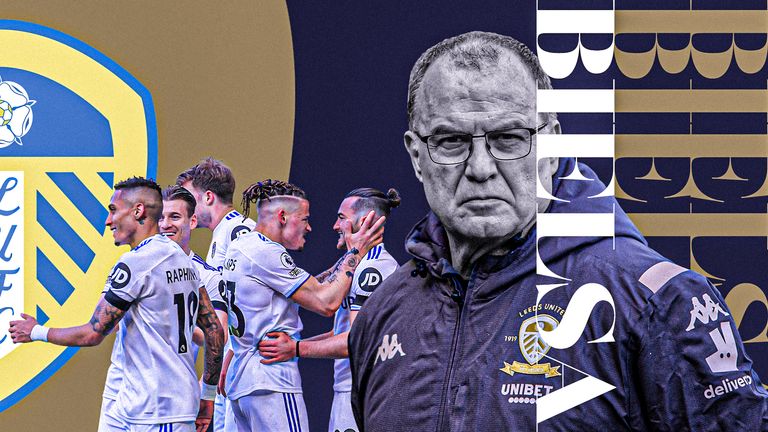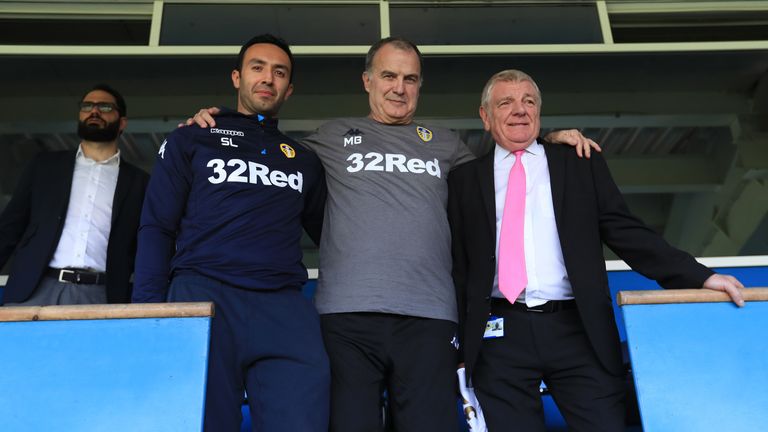Marcelo Bielsa's Leeds: Salim Lamrani on how litter picking and helping the homeless led to cultural change
In an exclusive interview with Sky Sports, Marcelo Bielsa’s translator turned discipline coach Salim Lamrani shares stories of litter collection and helping the homeless that illustrate the impact that the Argentine had at Leeds – and why he will never be forgotten
Wednesday 15 June 2022 10:32, UK
Salim Lamrani had been Marcelo Bielsa’s translator at Lille but the Argentine coach envisaged a different role for him at Leeds. In 2018, Lamrani became Bielsa’s discipline coach, in charge of conflict prevention and the transmission of values.
What followed was dramatic. "Bielsa managed to transform the culture of the club," Lamrani tells Sky Sports. His Leeds team galvanised the city, eventually winning promotion to the Premier League for the first time in a generation and managing to stay there.
Bielsa did it his way. "The only football a coach can offer is the one that runs through his veins," says Lamrani. "He was able to instil in the players, and also in the supporters, the conviction that anything was possible. The Leeds United supporters embraced it."
On the field, Bielsa's football inspired. Off it, his ethos made Leeds fans proud. His players collected litter at the training ground and helped feed the homeless in winter. It was about humility and respect. Encouraged by his boss, these were the ideas of Lamrani.
He had received some direction from Bielsa, who saw this university professor fulfilling duties similar to that of Manel Estiarte, Pep Guardiola's long-time confidant at Manchester City. But it was really quite new. "The role was a major challenge," says Lamrani.
The Frenchman was a football fan but Bielsa told him to find inspiration from elsewhere. He advised him to read a book by Phil Jackson, the former Chicago Bulls coach. "He is a legend of sport. I discovered the basic principles of group management."
But for the most part, Lamrani was permitted to follow his instincts. Bielsa had noted his knack for reading people, an appreciation of group dynamics. He wanted Lamrani to use this to foster team spirit, build a connection between the players and the club.
"There are four aspects to football: physical, technical, tactical and mental. In most big clubs, there is a certain homogeneity to the first three areas. In high-level sport, the biggest difference between clubs is sometimes this mental aspect of the game.
"The role of discipline coach is halfway between mediator and psychologist, responsible for attending to the players' needs, preventing conflict, transmitting values. It is about solving problems within the squad so that the coach can concentrate on football."
Earning trust was the starting point. "When I arrived, I first went through a group observation phase for two weeks, where I got to know the players and the different personalities within the group. My office was right next to the players' dressing room.
"My priority was first to earn the respect of the players in order to have the moral authority necessary to implement my projects. I tried to be close to them, listening to their expectations, without being intrusive. My teaching experience and language skills helped.
"To get the group to be receptive to the plans that I had for them, I decided to carry out all the pre-season physical sessions with the players myself. It was a demanding ordeal that lasted six weeks but this investment allowed me to earn the respect of the group.
"For example, one of my tasks was to monitor the players' weight. So I asked the nutritionist to set me a similar goal and I lost eight kilos. This effort allowed me to better understand the psychology of the players facing this challenge and gain their respect."
That allowed him to float an idea that later gained traction among the world's media. Just two weeks into the season, Bielsa's players could be seen collecting the litter that had gathered around the grounds of the club's training complex. It was a symbolic moment.
"The first objective was to work on the notion of humility, fundamental for success in high-level sport," explains Lamrani. "The other goal was to pay tribute to the supporters, often from modest backgrounds, who make significant sacrifices to follow their club."
"It reminded us that they are the soul of football."
Lamrani incorporated it into the club's training programme - calling it the path to humility. "When the time came, I gathered the players in the gym. We sat in an arc, around bags and plastic gloves that I had prepared, in order to promote a conversation."
He had done his homework, researching the minimum wage in England and calculating how many hours of work it took to attend a game at Elland Road. "I suggested they pay tribute with some work of their own. The feedback from the players was very positive."
The squad collected around 13 kilograms of rubbish - coach Benoit Delaval had it weighed. Adam Forshaw approached Lamrani to tell him he thought the project had been good for the group. "That encouraged me to offer other out-of-the-ordinary activities."
Not long after came another unusual venture at his instigation. "During my walks in the city centre, I became aware of the presence of many homeless people, sometimes young people. So the idea came to me to offer the group a weekly tour to help them."

A recurring theme of Lamrani's new book, Marcelo Bielsa: The Foundation of Success at Leeds United, is how grounded this group were and how receptive they proved to these ideas. Gaetano Berardi was a close companion of Lamrani, but he was not alone.
He recalls trips to Poundland with Gjanni Alioski and Samu Saiz. When they went to help the homeless, Pablo Hernandez even took his young son along. For the supporters, it escalated their pride in the players. For the players, it rooted them in the community.
"We made seven food packets each, with the idea of symbolically feeding one person a day. The round lasted about two hours and we tried to talk for a few minutes with the people we met. We did this activity with the players during the winter once a week.
"The objective was twofold: to work on the value of solidarity with people in need and to put your own difficulties into perspective by discovering that others have to overcome much greater obstacles than those that punctuate the career of a professional footballer.
"I don't know if it made them better players, but I'm sure it made them better human beings. That's what matters in the end. Not all good people are happy, but it is impossible to be happy if you are not a good person. Being kind is the first step to happiness."
Perhaps it is this thought, as much as the thrilling football and the renaissance on the pitch, that helps to explain why Bielsa is still adored in Leeds. He developed a winning team but he also managed to convince everyone along for the ride that it meant more too.
That is how Lamrani remembers it. He returned to his day job after that year with Bielsa in Leeds. "My first profession is teaching and research," he says. But he has not ruled out a return for this reason. "Football offers something priceless: unforgettable emotions."
That is what Marcelo Bielsa gave to Leeds.
"He managed to bring the club back to the first division after a long journey through the desert and I believe that the supporters are grateful to him for having brought them happiness," says Lamrani. "For allowing them to be proud of their team again."
MARCELO BIELSA, The Foundation of Success at Leeds United, By Salim Lamrani, out now from Pitch Publishing





